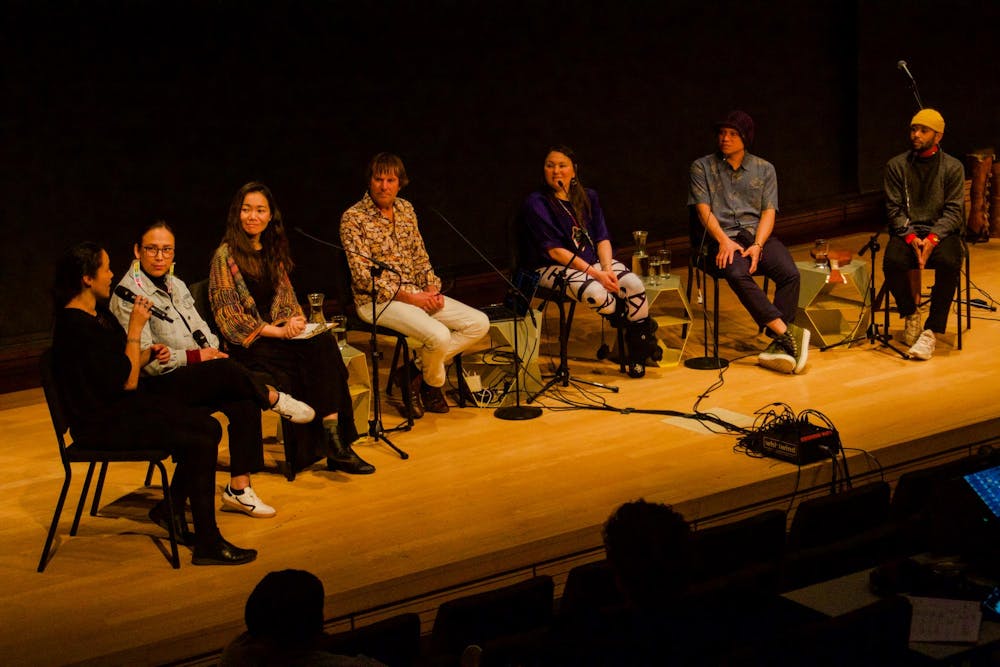Content warning: This article includes mentions of suicide.
On Tuesday, Brown Arts Institute and Providence nonprofit FirstWorks co-hosted a panel titled “Climate Change: Our Response as Artivists.” The public event — hosted in the Martinos Auditorium at the Granoff Center for the Creative Arts — marked the first event of Canadian Inuk multidisciplinary artist Tanya Tagaq’s collaborative artist residency at Brown.
The event is the latest in BAI’s IGNITE series program, which imagines art as a tool for social change.
Tagaq was joined on stage by members of music, film and performing arts group Small Island Big Song, Greenlandic drum dancer Varna GL and Inuk throat singer Nancy Makittuq Mike. The group discussed climate change and artist-activists’ responsibilities to help preserve the environment. The group addressed a central question: “What will we tell our children if we fail to protect our planet?”
Excerpts from films and creative documentaries directed by Tagaq and SIBS were also screened to the audience. BaoBao Chen, co-founder and creative producer of SIBS, moderated the panel.
Before the discussion, Lynsea Montanari, museum educator associate at the Tomaquag Museum, performed a song welcoming audiences to the event and the land of the Narragansett people.
The group first discussed the ways they each express their ties to their land and the surrounding environment through the art that they create.
“Any form of artmaking is a reflection of your environment,” Tagaq said, sharing her experience growing up in the Northwest islands of Canada and having her family relocated by the Canadian government.
“We were forced to change, and there have been good and bad repercussions from that,” Tagaq said, explaining why she uses music in her artistic practice. “There’s no other way to express such deep feelings like incandescent rage or the grief … or the joy and pride of being from people that are so resilient and strong,” Tagaq said.
Aremiti, a mononymous songwriter and performer with SIBS, discussed his efforts to reconnect with his Tahitian heritage through his art. “Now, I’m going back to my roots to learn the (traditional) language, putting it in my songs and learning the ancient rhythms that were forbidden to learn before,” he said.
The artists also discussed how climate change has directly impacted their lives within their communities, explaining how the environment plays a thematic role in their craft.
With “traditional throat singing, a lot of the songs imitate sounds of nature … such as the wind, the river (and) mosquitoes,” Mike said, reflecting on her artistic craft and identity. “The relationship we have with the land is very harmonious. It creates balance in our lives … When you think about throat singing, we have to be connected to the land … and have that relationship in order to survive in our environment.”
Sam Roem, an Australian-based performing artist, explained how the traditional Papuan dance and song he practices “copies how animals react” in the process of hunting and giving thanks to the nourishment that nature offers to people. “Every movement … (has) symbols meaning something about the culture.”
The panel concluded with a musical performance from SIBS company members and a collaborative throat singing performance by Tagaq, Varna and Mike.
During the question-and-answer portion of the event, an audience member asked if the panelists felt like their art had saved their lives. In response, Varna shared her experience losing her brother to suicide.
“The day we buried my brother was the day I decided to drum, and I never stopped,” Varna said.
Tagaq addressed the spiritual strength embodied by the Inuk people when answering the question, also pointing to a significant familial connection. “When I sing with my sisters, that gives me more strength to live even though we witness so much,” Tagaq said.
“There is nothing stronger than survival. It’s the human spirit,” she added. “Nothing can break us no matter what.”
After the event, attendees positively highlighted the diversity and vulnerability of the panel.
Deanne Fernandes, a MFA student at the Rhode Island School of Design, was interested in the panel due to her own work, which investigates the intersection of sociology and illustration. She was impressed by “the honesty and the pride with which (the panelists) tell their stories.”
“We are used to the capitalist system of functioning and we (tend to) shy away from revealing where we come from and being proud of the way we create art,” Fernandes said. “Seeing (the panelists’ pride) was really emotional for me.”
According to Chen, choosing guests to feature in the panel was a thoughtful task. “When we were discussing our performance and residency … we said that we’d really like to come in contact with the local community, especially Native American artists,” Chen said in an interview with The Herald.
Chen co-founded SIBS in 2015 with Tim Cole — who also spoke at the panel about his video production work with the company — after learning of the endangering effects that climate change has on small island nations. Since February, the company has been performing across the country as part of their “Our Island” tour.
“I hope anyone who comes to see our show or is a part of any (of our) events will get a feeling that we can all do something,” Chen said. “No individual is too small to respond to an issue that (they) care about.”
Tagaq will perform with the Kronos Quartet and other special guests at the Lindemann Performing Arts Center this Friday and Sunday.
Isabel Hahn is an Arts & Culture editor who concentrates in English and Behavioral Decision Sciences. In her free time, she enjoys watching movies, reading, and journaling.





